 Tenders and Job Opportunities
Tenders and Job Opportunities Job calls
Job calls Scholarships and research fellowships
Scholarships and research fellowships Open Calls
Open Calls ENGLISH
ENGLISH Pages
Pages
Pages
Physiology and Behavior
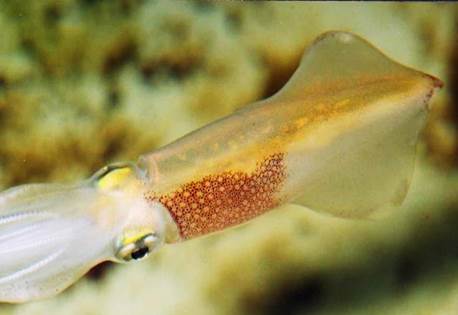 The Physiology and Behavior area is devoted to research in fields including physiology, neuroscience and behavior of marine organisms, with a focus on the evaluation of neural and behavioral plasticity. This is organized into three dedicated platforms:
The Physiology and Behavior area is devoted to research in fields including physiology, neuroscience and behavior of marine organisms, with a focus on the evaluation of neural and behavioral plasticity. This is organized into three dedicated platforms:
 Manager: Pamela Imperadore
Manager: Pamela Imperadore
This email address is being protected from spambots. You need JavaScript enabled to view it.
Extension #232
First Floor EAST Wing
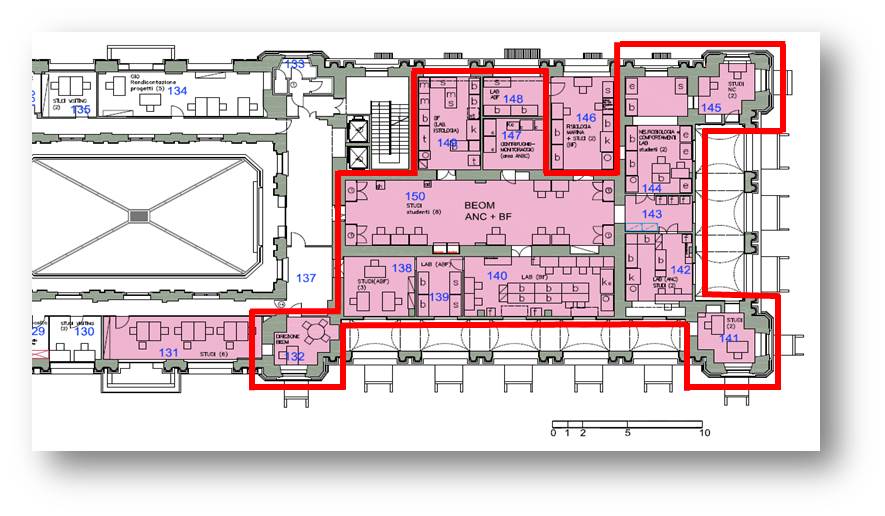
Developmental Molecular Biology
 The Developmental Molecular Biology area is dedicated to the analysis and study of the regulatory mechanisms that govern development of marine organisms. This includes the following dedicated platforms:
The Developmental Molecular Biology area is dedicated to the analysis and study of the regulatory mechanisms that govern development of marine organisms. This includes the following dedicated platforms:
- Electrophoresis and PCR
- Centrifugation and Ultracentrifugation
- Nucleic Acid Extraction and Purification
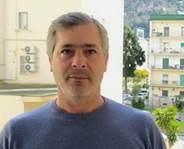 Manager: Alessandro Amoroso
Manager: Alessandro Amoroso
This email address is being protected from spambots. You need JavaScript enabled to view it.
Extension #345
| First Floor EST Wing | Second Floor EST Wing |
 |
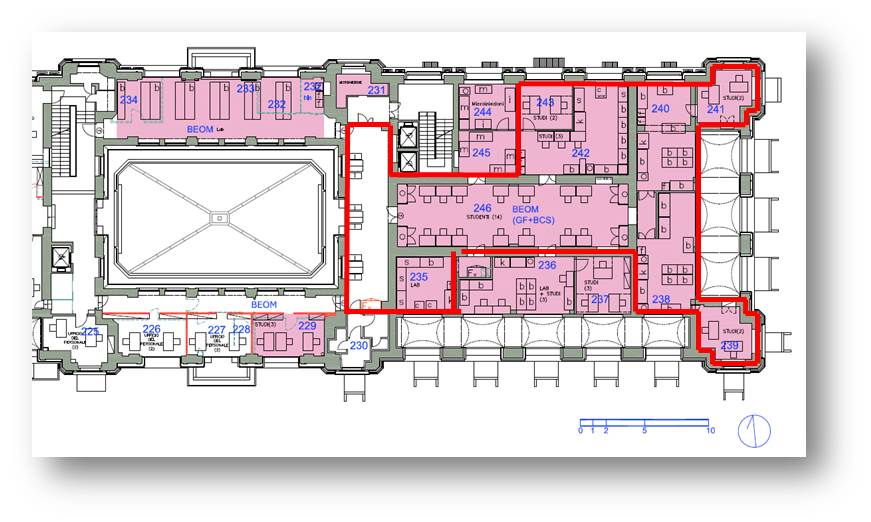 |
Electrophoresis and PCR
 The Electrophoresis and PCR platform is equipped with several PCR machines (9) and with the necessary equipment for the: preparation of agarose gel, electrophoresis gel running, UV image acquisition, quantification of nucleic acids (NanoDrop).
The Electrophoresis and PCR platform is equipped with several PCR machines (9) and with the necessary equipment for the: preparation of agarose gel, electrophoresis gel running, UV image acquisition, quantification of nucleic acids (NanoDrop).
 Managere: Alessandro Amoroso
Managere: Alessandro Amoroso
This email address is being protected from spambots. You need JavaScript enabled to view it.
Extension #345
| Bookable Equipment | 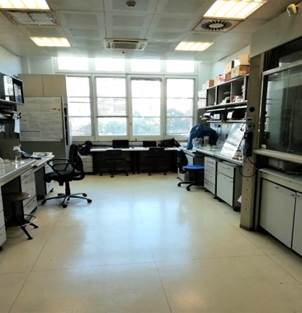 |
| Room #146 | |
| Chemical Hood for the purification of nucleic acids | |
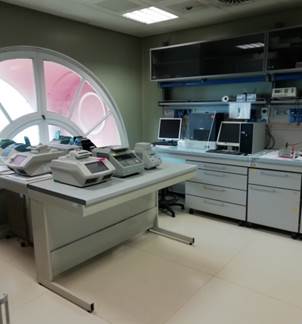 |
|
| Room #235 | |
| - PCR HYBAID Express #1 | |
| - PCR HYBAID Express #2 | |
| - PCR HYBAID PX2 | |
| - PCR BIORAD C1000 #1 | |
| - PCR BIORAD C1000 #2 | |
| - PCR MJResearch PTC 100 | |
| - PCR MJResearch MiniCycler | |
| - PCR GeneAmp System 9700 | |
| - PCR EPPENDORF Mastercycler | |
| - Thermostated Bath JULABO SW22 | |
| - Thermostated Bath GFL | |
| - Hybridization Oven FINEPCR | |
| - Hybridization Oven TECNE | |
| Book on LabAgenda: instructions for users |
|
Primo piano Ala EST, #146 |
Secondo piano Ala EST, #235 |
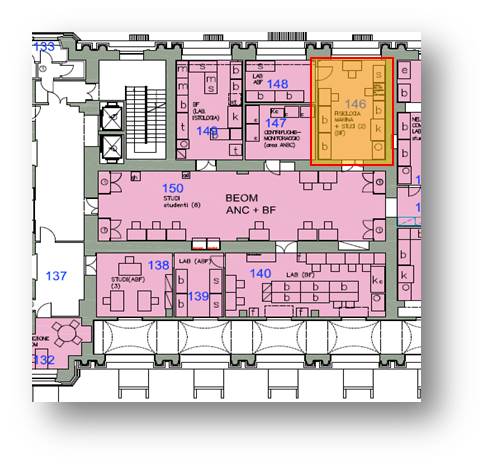 |
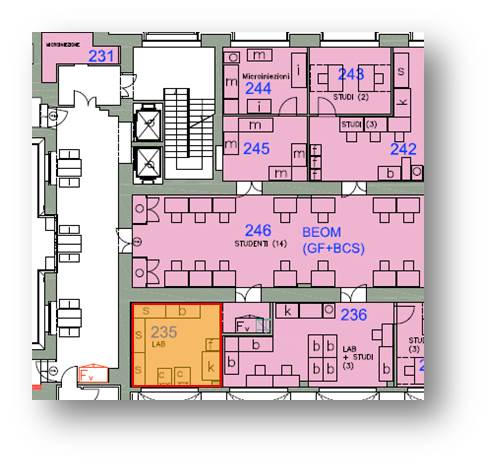 |
Centrifugation and Ultracentrifugation
 The Centrifugation and Ultracentrifugation platform is equipped with various instruments which allow centrifugation at different speeds (up to 90000 rpm in the case of Ultracentrifugation), with fixed angle or swinging bucket rotors, at controlled temperature.
The Centrifugation and Ultracentrifugation platform is equipped with various instruments which allow centrifugation at different speeds (up to 90000 rpm in the case of Ultracentrifugation), with fixed angle or swinging bucket rotors, at controlled temperature.
 Manager: Alessandro Amoroso
Manager: Alessandro Amoroso
This email address is being protected from spambots. You need JavaScript enabled to view it.
Extension #345
| Bookable Equipment |
| Room #246 |
| - Concentrator EPPENDORF 5301 |
| - Refrigerate Centrifuge 15/50mL EPPENDORF 5810R |
| - Refrigerate Centrifuge EPPENDORF 5430R |
| - Incubator Shaker INNOVA 4 |
| Landing |
| - Ultracentrifuge BECKMAN Optima XL 100K |
| - Centrifuge BECKMAN AvantiJ25 |
| - Centrifuge BECKMAN J2 MC |
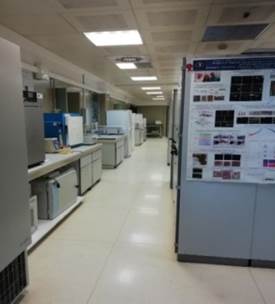
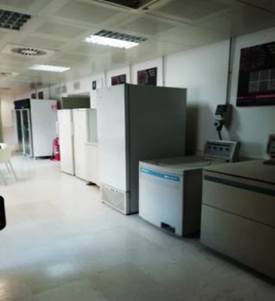
|
Second Floor Room #246 and landing |
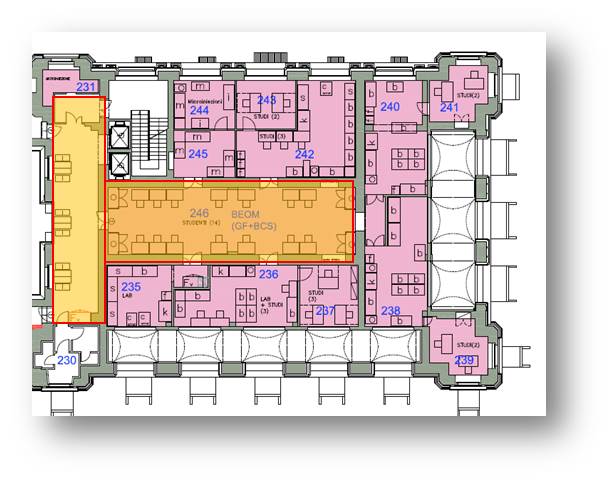 |
Nucleic Acid Extraction and Purification
 The Nucleic Acid Extraction and Purification platform is organized in different locations: one on the first floor and two on second floor of the East Wing. These laboratories are equipped with hoods dedicated to various activities.
The Nucleic Acid Extraction and Purification platform is organized in different locations: one on the first floor and two on second floor of the East Wing. These laboratories are equipped with hoods dedicated to various activities.
 Manager: Alessandro Amoroso
Manager: Alessandro Amoroso
This email address is being protected from spambots. You need JavaScript enabled to view it.
Extension #345
| Bookable Equipment | |
| Room #146 | |
| Chemical Hood for the purification of nucleic acids |  |
| Room #242 | |
|
Chemical Hood equipped with pHmeter THERMO |
 |
| Room #238 | |
| Chemical Hood for the purification of nucleic acids | 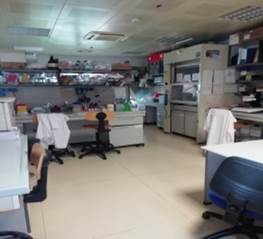 |
| Book on LabAgenda: instructions for users | |
|
Primo piano Ala EST, #146 |
Secondo Piano Ala EST: Stanze # 242 e 238 |
 |
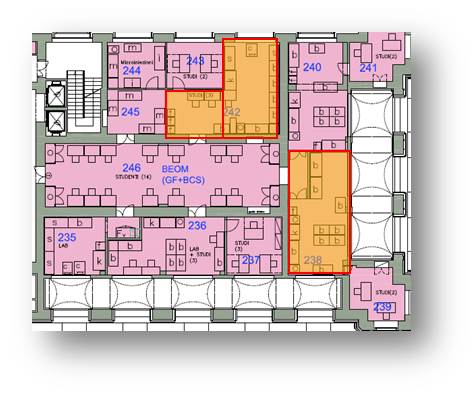 |
International Summer School of Natural Products (ISSNP)

DEADLINES
March 1, 2019 Fellowship application
April 1, 2019 Announcement of the official School Programme
May 15, 2019 Abstract Submission
May 15, 2019 Early Registration
May 31, 2019 Notification of Acceptance type (Oral or Poster)
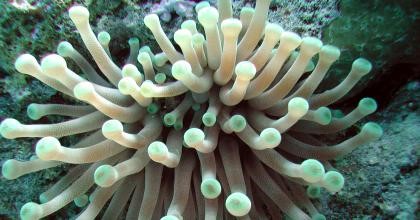 The 3rd edition will take place in July 2019 at the University Centre - CESTEV in Naples, from the 1st to the 4th July and at the Hotel Pianeta Mare in Maratea from the 4th to 5th of July 2019.
The 3rd edition will take place in July 2019 at the University Centre - CESTEV in Naples, from the 1st to the 4th July and at the Hotel Pianeta Mare in Maratea from the 4th to 5th of July 2019.
This course is designed for PhD students and young researchers aiming to acquire an interdisciplinary and intersectoral understanding of the state of the art in Natural Products.
Led by academics from Federico II University, the participants will focus on Natural Products chemistry, biology, ecology, pharmacology and more.
A combination of lectures, seminars and interactive sessions will provide an immersive and challenging experience and team-based problem solving activities will help the participants to be prepared for future research studies in these fields.
In addition, interactive sessions on transferable skills, including teamwork, leadership, personal effectiveness, entrepreneurship and innovation, will give the participants training in order to combine research excellence with novel approaches in communication and dissemination strategies.
As an international summer school, ISSNP provides the opportunity to enjoy an exciting experience in a highly stimulating environment and in one of the most inspiring countries in the world, Italy.
Previous participants have highlighted that ISSNP is an enriching event both professionally and personally.
All students are expected to submit an abstract and may apply for a short oral communication and/or a poster presentation.
The poster communications are briefly presented by the authors during lively open sessions, in line with the main aim of the school to create a friendly environment and provide the opportunity to young scientists, post-docs and PhD students to meet leading scientists of high international repute in a very relaxed and informal atmosphere.
Have a glance on the scheduled programme through the link: http://www.issnp.org
Please be informed that the "Abstract Submission" procedure for ISSNP 2017 is now available through School web site. Authors are asked to submit a one page abstract using the information available at the web link: http://www.issnp.org/en/abstract-info.php Kindly feel free to contact us (This email address is being protected from spambots. You need JavaScript enabled to view it.) for any further queries.
We look forward to welcoming you in Naples in July 2019!
ISSNP 2019 – The Organizing Committee and the Scientific Committee
Venue
University Centre - CESTEV in Naples, from the 1st to the 4th July and Hotel Pianeta Mare in Maratea from the 4th to 5th of July 2019. (www.issnp.org)
Registration
To register visit to the Registration Page for the I Edition of the International Summer School on Natural Products (ISSNP) at http://www.issnp.org/en/registration-info.php
Registration fee includes:
a) participation in all the School events during the five-day programme
b) copies of the slides presented by each lecturer
c) course notes
d) lunches
e) Pizza Party
f) transportation by bus from Napoli to Maratea (and back)
g) Evra visit (leader company in the field of plants extracts, typical of the Mediterranean area) "Cristo di Maratea" visit (the third tallest statue of Jesus in Europe located on the summit of Monte San Biagio)
h) Overnight in a four people occupancy bedroom at Hotel Pianeta Maratea
i) Social Pool party
Organizing Secretariat
YES Meet
E-mail: This email address is being protected from spambots. You need JavaScript enabled to view it.
Tel: +39 0818770604
Fax: +39 0818770258
Organizing committee
Giorgia OLIVIERO, Coordinator (Università degli Studi di Napoli Federico II) This email address is being protected from spambots. You need JavaScript enabled to view it.
Adele CUTIGNANO (Istituto di chimica biomolecolare, CNR)
Germana ESPOSITO (Università degli Studi di Napoli Federico II)
Luigi MILELLA (Università degli Studi della Basilicata)
Giovanna ROMANO (Stazione Zoologica, Anton Dohrn)
Valentina SEPE (Università degli Studi di Napoli Federico II)
Scientific committee
Valeria COSTANTINO, President (Università degli Studi di Napoli Federico II)
Maurizio D'AURIA (Università degli Studi della Basilicata)
Gabriele FONTANA (Indena)
Alberto MINASSI (Università degli Studi del Piemonte Orientale)
Daniela MONTESARCHIO (Università degli Studi di Napoli Federico II)
Maria Chiara MONTI (Università degli Studi di Salerno)
Vera MUCCILLI (Università degli Studi di Catania)
Daniele PASSARELLA (Università degli Studi di Milano)
Laura CIPOLLA (Università degli Studi di Milano)
William GERWICK (Department of Biology and Marine Biology and Center for Marine Science, UNCW)
Approccio ecosistemico alla pesca ed acquacoltura sostenibile
PROGETTI RETROSPETTIVI COERENTI CON LA MISURA 3.5 DEL FEP CAMPANIA 2007 – 2013 (ex D.D. del 21.12.2015, n° 854)
Responsabile Scientifico: Gabriele Procaccini
Il progetto “APPROCCIO ECOSISTEMICO ALLA PESCA ED ACQUACOLTURA SOSTENIBILE” prevede lo sviluppo, ed utilizzo di strumenti e metodologie a supporto dell’implementazione di un approccio ecosistemico alla gestione della pesca ed allo sviluppo di metodi innovativi per l'acquacoltura, anche con finalità di gestione adattativa e nell’ottica della sostenibilità ambientale. Le attività di ricerca comprendevano una serie di attività suddivise nei seguenti WP:
1. Modellazione di habitat e connettività
2. Identificazione degli stock boundaries delle principali specie commerciali
3. Produzione di nuove specie di invertebrati e vertebrati marini per l’acquacoltura mediterranea
4. Ottimizzazione delle condizioni di allevamento (welfare) degli animali e valutazione degli effetti sulla qualità del prodotto finale
5. Sperimentazioni finalizzate alla formulazione di mangimi innovativi ed ecosostenibili
6. Approccio ecosistemico alla gestione integrata della zona costiera.
7. Rapid Environmental Assessment
8. Modellistica ecologica e biogeochimica
Nel corso delle diverse attività ci si propone di:
- identificare scenari da analizzare per le diverse aree studio, possibilmente attraverso il coinvolgimento di diversi portatori di interessi ed esperti, e tenuto conto delle indicazioni comunitarie, anche attraverso l’uso di tipo adaptive management workshops
-sviluppare ed utilizzare modelli idrodinamici e tecniche lagrangiane per la descrizione di parametri utili a caratterizzare gli habitat (parametri fisici quali temperatura, salinità, campo di corrente, connettività fra aree, trasporto larvale)
- sperimentare nuovi strumenti di identificazione degli stock del pescato tramite approcci di tipo molecolare
- sperimentare tecniche ed approcci per sviluppare un allevamento sostenibile e migliorare la produttività in attività di acquacoltura
- sviluppare modelli numerici di rete trofica
- verificare la vulnerabilità di ecosistemi costieri d'interesse per il reclutamento di specie ittiche
- sviluppare metodi di pronto intervento in caso di emergenze ambientali per eventi naturali e legatio ad attività antropiche
I risultati raggiunti sono di seguito indicati
WP1
- Sintesi bibliografica sulla dispersione orizzontale costa-largo e inter-gyre
- Analisi IBM esistenti e sviluppo modulo Lagrangiano
- Valutazione rapporto su connettività tra strutture oceaniche
- Atlante della connettività per piccoli pelagici
WP2
- Sintesi bibliografica sulla genetica di popolazione di Engraulis encrasicholus, Octopus vulgaris e Pseudo-nitzschia multistriata
- Lista di marcatori molecolari individuo-specifici per la genetica di popolazione di Engraulis encrasicholus, Octopus vulgaris e Pseudo-nitzschia multistriata
- Definizione della struttura genetica su scala spaziale delle specie in esame
- Messa a punto di un tagging genetico per la caratterizzazione genetica delle varietà di alice presenti nei mercati ittici
WP3
- Verifica e standardizzazione delle condizioni stabulazione e mantenimento
- Formazione degli stock di allevamento e valutazione delle condizioni che favoriscono accrescimento
- Monitoraggio e ottimizzazione delle condizioni di allevamento e di benessere animale
- Determinazione dei parametri e delle procedure di mantenimento e allevamento e produzione di larve per ricaduta applicativa
WP4
- Indagine preliminare sullo stress di animali di allevamento
- Identificazione e misurazione degli indicatori fisio-comportamentali di benessere animale
- Benchmarking delle condizioni di allevamento e mantenimento a seguito dell’applicazione degli indicatori del benessere animale
- Messa a punto di protocolli di allevamento e mantenimento delle specie che garantiscano il benessere animale
- Messa a punto di procedure e/o sensori e/o tecnologie semi-automatiche per il monitoraggio del benessere e della ‘qualità’ fisiologica del prodotto in relazione alle specie indicate
WP5
- Revisione dello stato dell'arte sulle condizioni di crescita di micro-alghe
- Sviluppo e test di un sistema luminoso adattato alla crescita delle micro-alghe e per la sua massimizzazione
- Formulazione delle condizioni di luce ottimale per massimizzare la crescita algale
- Valutazione del ruolo della fotoacclimatazione e della fotoregolazione sulla produzione fotosintetica
- Formulazione di un appropriato mezzo di coltura per la crescita algale che possa rispondere sia a performance di crescita algale sia al costo del mezzo di coltura
- Review sulle specie microalgali utilizzabili nella nutraceutica sulla base delle loro caratteristiche biochimiche, ecologiche e di crescita in laboratorio
WP6
- stima dei flussi di materia in ecosistemi bentonici
- impatto del cibo sulla riproduzione di piccoli crostacei
- impatto dell'acidificazione sul funzionamento di reti trofiche bentoniche
WP7
- messa a punto di sistemi automatici, autonomi e non, per l'early warning di fioriture algali tossiche
WP8
- costruzione di un modello di rete trofica planctonica basato su Ecopath e stima dei flussi di carbonio disponibile per la componente ittica
1. Amodio, P., Andrews, P., Salemme, M., Ponte, G., & Fiorito, G. (2014) The Use of Artificial Crabs for Testing Predatory Behavior and Health in the Octopus. Altex, 31(4), 494-499.
2. Barra, L., Chandrasekaran, R., Corato, F., Brunet, C. (2014) The challenge of ecophysiological biodiversity for biotechnological applications of marine microalgae. Marine drugs, 12(3): 1641-1675.
3. Brunet C., R. Chandrasekaran, L. Barra, V. Giovagnetti, F. Corato and A.V. Ruban. 2014. Spectral radiation dependent photoprotective mechanism in diatom Pseudo-nitzschia multistriata. Plos One, 9(1): e87015. doi:10.1371/journal.pone.0087015.
4. Chandrasekaran, R., Barra, L., Carillo, S., Caruso, T., Corsaro, L., Dal Piaz, F., Graziani, G., Corato, F., Pepe, D., Manfredonia, A., Orefice, I., Ruban, A., Brunet, C. (2014) Light modulation of biomass and macromolecular composition of the diatom Skeletonema marinoi. Journal of Biotechnology, 192: 114-122.
5. D'Alelio, D., Mazzocchi, M.G., Montresor, M., Sarno, S., Zingone, Di Capua, I., Franzè, G., Margiotta, F., Saggiomo, V., Ribera d'Alcalà, M. (2014). The green–blue swing: plasticity of plankton food webs in response to coastal oceanographic dynamics. Marine Ecology. DOI: 10.1111/maec.12211.
6. D'Alelio, D., Ruggiero, M.V. Interspecific plastidial recombination in the diatom genus pseudo-nitzschia. Journal of Phycology. DOI: 10.1111/jpy.12350.
7. Dattolo, E., Gu J., Bayer, P.E., Mazzuca, S., Serra, I.A, Spadafora, A., Bernardo, L., Natali, L., Cavallini A., Procaccini, G. (2013) Acclimation to different depths by the marine angiosperm Posidonia oceanica: transcriptomic and proteomic profiles. Front. Plant Sci. 4, 195 doi: 10.3389/fpls.2013.00195.
8. Dattolo, E., Ruocco, M., Brunet, C., Lorenti, M., Lauritano, C., Sanges, R., De Luca, P., Procaccini, G. (2014) Response of the seagrass Posidonia oceanica to different light environments: insight from a combined molecular and photo-physiological study. Marine Environmental Research, 101, 225-236.
9. De Luca, D., Catanese, G., Fiorito, G., Procaccini, G. (2015) A new set of pure microsatellite loci in the common octopus Octopus vulgaris Cuvier, 1797 for multiplex PCR assay and their cross-amplification in O. maya Voss & Solís Ramírez, 1966. Conservation Genetic Resources 7:299–301.
10. De Luca, D., Catanese, G., Procaccini, G., Fiorito, G. (2014) An integration of historical records and genetic data to the assessment of global distribution and population structure in Octopus vulgaris. Frontiers in Ecology and Evolution, doi: 103389/fevo.2014.00055.
11. Donnarumma, L., Lombardi, C., Cocito, S., Gambi, M.C. (2014). Settlement pattern of Posidonia oceanica epibionts along a gradient of ocean acidification: an approach with mimics. Mediterranean Marine Science. DOI: http://dx.doi.org/10.12681/mms.677.
12. Fiorito, G., Affuso, A., Anderson, D.B., Basil, J., Bonnaud, L., Botta, G., Cole, A., D’Angelo, L., de Girolamo, P., Dennison, N., Dickel, L., Di Cosmo, A., Di Cristo, C., Gestal, C., Fonseca, R., Grasso, F., Kristiansen, T., Kuba, M., Maffucci, F., Manciocco, A., Mark, F.C., Melillo, D., Osorio, D., Palumbo, A., Perkins, K., Ponte, G., Raspa, M., Shashar, N., Smith, J., Smith, D., Sykes, A., Villanueva, R., Tublitz, N., Zullo, L., Andrews, P.L.R. (2014). Cephalopods in neuroscience: regulations, research and the 3Rs. Invertebrate Neuroscience, 14(1), 13-36.
13. Fiorito, G., Affuso, A., Basil, J., Cole, A., de Girolamo, P., D'Angelo, L., Dickel, L., Gestal, C., Grasso, F., Kuba, M., Mark, F.C., Melillo, D., Osorio, D., Perkins, K., Ponte, G., Raspa, M., Shashar, N., Smith, D., Smith, J., Andrews, P.L.R.(2015). Guidelines for the Care and Welfare of Cephalopods in Research–A consensus based on an initiative by CephRes, FELASA and the Boyd Group. Laboratory animals, 49(2 suppl), 1-90.
14. Gallina A.A., Brunet C., Palumbo A., and Casotti R., 2014. Effect of Polyunsaturated Aldehydes on Skeletonema marinoi (Bacillariophyceae): Involvement of Reactive Oxygen Species and Nitric Oxide. Mar Drugs, 12: 4165-4187
15. Garrard, S.L., Gambi, M.C., Scipione, M.B., Patti, F.P., Lorenti, M., Zupo, V., Bruun, J., Paterson, D.M., Buia, M.C. (2014) Indirect effects may buffer negative responses of seagrass invertebrate communities to ocean acidification. Journal of Experimental Marine Biology and Ecology 461: 31–38
16. Giovagnetti, V., Flori, S., Tramontano, F., Lavaud, J.,Brunet, C. (2014) The velocity of light intensity increase modulates the photoprotective response in coastal diatoms. PlosOne, 9 (8): e103782.
17. Holden-Dye, L., Fiorito, G., Ponte, G. (2015). Invertebrate neuroscience and CephsInAction at the Mediterranean Society for Neuroscience Meeting Cagliari 2015. Invertebrate Neuroscience, 15(4), 1-4.
18. Josef, N., Berenshtein, I., Fiorito, G., Sykes, A. V., & Shashar, N. (2015). Camouflage during movement in the European cuttlefish (Sepia officinalis). The Journal of experimental biology, jeb-122481.
19. Josef, N., Mann, O., Sykes, A. V., Fiorito, G., Reis, J., Maccusker, S., & Shashar, N. (2014). Depth perception: cuttlefish (Sepia officinalis) respond to visual texture density gradients. Animal cognition, 17(6), 1393-1400.
20. Lamari, N., Ruggiero, M.V., d’Ippolito, G., Kooistra, W.H.C.F., Fontana, A., Montresor, M. (2013) Specificity of Lipoxygenase Pathways Supports Species Delineation in the Marine Diatom Genus Pseudo-nitzschia. PLOS One, 8 (8), e73281.
21. Maibam, C., Fink, P., Romano, G., Buia, M.C., Gambi, M.C., Scipione, M.B., Patti, F.P., Lorenti, M., Butera, E., Zupo, V. (2014) Relevance of wound-activated compounds produced by diatoms as toxins and infochemicals for benthic invertebrates. Marine Biology, 161:1639-1652
22. Ponte, G., Fiorito, G. (2015) Immunohistochemical Analysis of Neuronal Networks in the Nervous System of Octopus vulgaris. Immunocytochemistry and Related Techniques, 63-79.
23. Porzio, L., Garrard, S., Buia, M.C. (2013) The effect of ocean acidification on early algal colonization stages at natural CO2 vents. Marine Biology, 160(8):2247-2259.
24. Ruggiero, M.V., Sarno, D., Barra, L., Kooistra, W.H.C.F., Montresor, M., Zingone, A. (2015) Diversity and temporal pattern of Pseudo-nitzschia species (Bacillariophyceae) through the molecular lens. Harmful Algae 42: 15–24.
25. Scalco, E., Amato, A., Ferrante, M.I., Montresor. M. The sexual phase of the diatom Pseudo-nitzschia multistriata: cytological and time-lapse cinematography characterization. Protoplasma.
26. Scalco, E., Stec, K., Iudicone, D., Ferrante, M.I., Montresor, M. (2014) The dynamics of sexual phase in the marine diatom Pseudo-nitzschia multistriata (Bacillariophyceae). Journal of Phycology, 50: 817-828.
27. Tesson, S., Montresor, M., Procaccini, G., Kooistra, W.H.F.C. (2014) Temporal changes in population structure of a marine planktonic diatom. PLOS One DOI:10.1371/journal.pone.0114984.
28. Villar, E., Farrant, G., Follows, M., Garczarek, L., Speich, S. Audic, S., Bittner, L., Blanke, B., Brum, J.R., Brunet, C., Casotti, R., Chase, A., Dolan, J.R., d'Ortenzio, F., Gattuso, J-P., Grima, N., Guidi, L., Hill, C.N., Jahn, O., Jamet, J-L., Le Goff, H., Lepoivre, C., Malviya, S., Pelletier, E., Romagnan, J-B., Roux, S. Santini, S., Scalco, E., Schwenck, S.M., Tanaka, A., Testor, P., Vannier, T., Vincent, F., Zingone, A., Dimier, C., Picheral, M., Searson, S., Kandels-Lewis, S., Tara Oceans coordinators, Acinas, S., Bork, P., Boss, E., de Vargas, C., Gorsky, G., Ogata, H., Pesant, S., Sullivan, M.B., Sunagawa, S., Wincker, P., Karsenti, E., Bowler, C., Not, F., Hingamp, P., Iudicone, D. (2015). Environmental characteristics of Agulhas rings affect inter-ocean plankton transport. Science 348(6237) doi: 10.1126/science.1261447
29. Yan, S., Catanese, G., Brown, C.L., Wang, M., Yang, C., Yang, T. (2015) Phylogeographic study on the chub mackerel (Scomber japonicus) in the Northwestern Pacific indicates the late Pleistocene population isolation. Marine Ecology, doi: 10.1111/maec.12267.
30. Zarrella, I., Ponte, G., Baldascino, E., & Fiorito, G. (2015) Learning and memory in Octopus vulgaris: a case of biological plasticity. Current opinion in neurobiology, 35, 74-79.
Rivelazione e caratterizzazione di inquinanti tossici in acqua di mare ed animali marini
PROGETTI RETROSPETTIVI COERENTI CON LA MISURA 3.5 DEL FEP CAMPANIA 2007 – 2013 (ex D.D. del 21.12.2015, n° 854)
Responsabile Scientifico: Giovanna Romano
Il progetto Rivelazione e caratterizzazione di inquinanti tossici in acqua di mare ed animali marini ha affrontato tematiche relative all’inquinamento ambientale con particolare riguardo all’inquinamento delle acque costiere marine da metalli pesanti ed idrocarburi policiclici aromatici, per l’impatto enorme che la presenza di queste sostanze tossiche può avere sulla salute dell’uomo, sia mediante contatto diretto sia attraverso il consumo di pesce e molluschi per uso alimentare.
Il progetto è stato finanziato nell'ambito della MISURA 3.5 DEL FEP CAMPANIA 2007 – 2013, (ex D.D. del 21.12.2015, n° 854).
Gli Istituti partner del progetto hanno svolto attività di ricerca focalizzate sulla messa a punto di metodi biochimici, biofisici e biologici per la determinazione sia del mercurio che di alcuni IPA, in acqua di mare o in matrici che ne mimano la composizione.
Le azioni previste dal Progetto hanno mirato in particolare alla caratterizzazione delle proprietà tossicologiche del mercurio in ricci di mare e copepodi nonché alla raccolta di dati analitici di concentrazione di mercurio e derivati di mercurio in molluschi cefalopodi per la caratterizzazione dei livelli di bio-accumulo di metalli in traccia e di sostanze derivate dall’attività umana allo scopo di individuare le eventuali possibili ricadute sul benessere animale e non da ultimo sulla “biosicurezza”.
Il nostro ruolo: La Stazione Zoologica ha coordinato il progetto ed è stata responsabile dell’obiettivo 3 (Valutazione della tossicità del mercurio e altri metalli pesanti su organismi marini di rilevanza ecologica) e dell’obiettivo 5 (Raccolta di dati analitici di concentrazione di mercurio e derivati di mercurio per la caratterizzazione dei livelli di bio-accumulo di metalli in cefalopodi).
Gli obiettivi principali sono stati la valutazione degli effetti di mercurio e altri metalli pesanti su organismi marini che rivestono un ruolo ecologico di grande rilevanza per nella colonna d’acqua (copepodi) e sui fondali, a diretto contatto dei sedimenti (riccio di mare). In considerazione del fondamentale ruolo dei copepodi e dei ricci nell’ambiente marino, abbiamo, condotto uno con l’obiettivo di ampliare il numero di ‘stress genes’ da impiegare come biomarker negli studi ecotossicologici. Sono stati valutati inoltre gli effetti della concentrazione di mercurio in diversi tessuti di due specie di cefalopodi (polpi, Octopus vulgaris; seppie, Sepia officinalis) ottenuti dal pescato locale. Un obiettivo collaterale di questo studio è stato quello di poter stabilire valori stimati di concentrazione di mercurio e suoi metaboliti in tessuti di cefalopodi in Tirreno (Golfo di Napoli) potendo così contribuire alla creazione di un network internazionale che possa contribuire ad uno studio “epidemiologico” sull’impatto delle concentrazioni di metalli pesanti e in traccia, tra cui il mercurio, su alcune specie chiave del pescato mondiale, quali proprio polpi e calamari.
Partners: Istituto di Biostrutture e Bioimmagini del CNR (CNR-IBB), Dipartimento di Biochimica, Biofisica e Patologia Generale (SUN-DBBPG), Dipartimento di Scienze e Tecnologie Ambientali, Biologiche e Farmaceutiche della Seconda Università degli Studi Napoli (SUN-DISTABIF), Stazione Zoologica Anton Dohrn (SZN) e Dipartimento di Fisica dell’Università Federico II di Napoli (UNINA-DIPFIS).
Publications
2020
Marchiori E, Dotto G, Tessarin C, Santoro M, Affuso A, Tarricone L, Di Renzo L, Freggi D, Spoto V, Marcer F (2020) A pilot study on molecular diagnosis of Hapalotrema mistroides (Digenea: Spirorchiidae) infection in blood samples of live loggerhead turtles Caretta caretta. BMC Veterinary Research 16: 16. https://doi.org/10.1186/s12917-020-2232-y
2019
Arcangeli A, Maffucci F, Atzori F, Azzolin M, Campana I, Carosso L, Crosti R, Frau F, David L, Di-Méglio N, Roul M, Gregorietti M, Mazzucato V, Pellegrino G, Giacoletti A, Paraboschi M, Zampollo A, de Lucia GA, Hochscheid S (2019) Turtles on the trash track: loggerhead turtles exposed to floating plastic in the Mediterranean Sea. Endangered Species Research 40: 107-121. DOI: https://doi.org/10.3354/esr00980
Hochscheid S., M. Aksissou, T. Arapis, M. Benabdi, L. Boura, A. Broderick, L. Cardona, C. Carreras, F. Claro, A. Demetropoulos, W. J. Fuller, I. Jribi, Y. Kaska, Y. Levy, F. Maffucci, D. Margaritoulis, C. Mifsud, A. Panagopoulou, J. Sacchi, J. Tomás, O. Türkozan, A. Rees (2019) Sea Turtles of the Mediterranean Sea. Special Feature – State of the World’s Sea Turtles SWOT Report XIV, Oceanic Society, Ross, CA, USA, pp. 20-29. https://www.seaturtlestatus.org/swot-report-vol-14
Pace A, Dipineto L, Fioretti A, Hochscheid S (2019) Loggerhead sea turtles as sentinels in the western Mediterranean: antibiotic resistance and environment-related modifications of Gram-negative bacteria. Marine Pollution Bulletin 149: 110575. https://doi.org/10.1016/j.marpolbul.2019.110575
Pace A, Rinaldi L, Ianniello D, Borrelli L, Cringoli G, Fioretti A, Hochscheid S, Dipineto L (2019) Gastrointestinal investigation of parasites and Enterobacteriaceae in loggerhead sea turtles from Italian coasts. BMC Veterinary Research 15: 370. https://doi.org/10.1186/s12917-019-2113-4
Riquet F, Liautard-Haag C, Woodall L, Bouza C, Louisy P, Hamer B, Otero-Ferrer F, Aublanc P, Béduneau V, Briard O, El Ayari T, Hochscheid S, Belkhir K, Arnaud-Haond S, Gagnaire P-A, Bierne N (2019) Parallel pattern of differentiation at a genomic island shared between clinal and mosaic hybrid zones in a complex of cryptic seahorse lineages. Evolution 73: 817-835. https://doi.org/10.1111/evo.13696
Publications
2020
Biasetti P, Florio D, Gili C, & de Mori B (2020) The Ethical Assessment of Touch Pools in Aquariums by Means of the Ethical Matrix. Journal of Agricultural and Environmental Ethics 33(2):337-353. https://doi.org/10.1007/s10806-020-09823-2
Camiñas, J.A.; Kaska, Y.; Hochscheid, S.; Casale P.; Panagopoulou, A.; Báez, J.C.; Otero, M. M.; Numa, C., Alcázar, E. (2020). Conservation of marine turtles in the Mediterranean sea [brochure]. IUCN, Malaga, Spain. https://www.iucn.org/sites/dev/files/content/documents/2020/conservation_of_mediterranean_turtles_in_the_mediterranean_sea.pdf
Casale P., Hochscheid S., Kaska Y., Panagopoulou A. (Eds.) (2020). Sea Turtles in the Mediterranean Region: MTSG Annual Regional Report 2020. Report of the IUCN-SSC Marine Turtle Specialist Group, 2020.
Centelleghe, C., Carraro, L., Gonzalvo, J., Rosso, M., Esposti, E., Gili, C., Bonato, M., Pedrotti, D., Cardazzo, B., Povinelli, M., & Mazzariol, S. (2020). The use of Unmanned Aerial Vehicles (UAVs) to sample the blow microbiome of small cetaceans. PloS one, 15(7), e0235537. https://doi.org/10.1371/journal.pone.0235537
Chimienti M., M.F. Blasi, S. Hochscheid (2020) Movement patterns of large juvenile loggerhead turtles in the Mediterranean Sea: ontogenetic space use in a small ocean basin. Ecology and Evolution 10(14), 6978- 6992. DOI:10.1002/ece3.6370
Krahl A., A. Lipphaus, P. Martin Sander, F. Maffuci, S. Hochscheid, U. Witzel (2020) Humerus osteology, myology, and finite element structure analysis of Cheloniidae. The Anatomical Record 303, 2177–2191. DOI:10.1002/ar.24311
Leonetti FL, Sperone E, Travaglini A, Mojetta AR, Signore M, Psomadakis PN, Dinkel TM, & Bottaro M (2020) Filling the Gap and Improving Conservation: How IUCN Red Lists and Historical Scientific Data Can Shed More Light on Threatened Sharks in the Italian Seas. Diversity 12(10):389. https://doi.org/10.3390/d12100389
Maffucci F., A. Pace, A. Affuso, M. Ciampa, G. Treglia, A. Pignalosa, S. Hochscheid (2020) Carapace scute pattern anomalies in the loggerhead turtle: are they indicative of hatchling’s survival probability? Journal of Zoology, 310(4), 315-322. https://doi.org/10.1111/jzo.12754
Marchiori E, Dotto G, Tessarin C, Santoro M, Affuso A, Tarricone L, Di Renzo L, Freggi D, Spoto V, Marcer F (2020) A pilot study on molecular diagnosis of Hapalotrema mistroides (Digenea: Spirorchiidae) infection in blood samples of live loggerhead turtles Caretta caretta. BMC Veterinary Research 16: 16. https://doi.org/10.1186/s12917-020-2232-y
Mennonna, G., B. Lamagna, A. Affuso, A. Greco, F. Micieli, D. Costanza, S. Hochscheid, L. Meomartino (2020) Normal ultrasonographic features of loggerhead (Caretta caretta) eyes. Natura Croatica, 29, Suppl. 1., 3-10. DOI: 10.20302/NC.2020.29.18
2019
Arcangeli A, Maffucci F, Atzori F, Azzolin M, Campana I, Carosso L, Crosti R, Frau F, David L, Di-Méglio N, Roul M, Gregorietti M, Mazzucato V, Pellegrino G, Giacoletti A, Paraboschi M, Zampollo A, de Lucia GA, Hochscheid S (2019) Turtles on the trash track: loggerhead turtles exposed to floating plastic in the Mediterranean Sea. Endangered Species Research 40: 107-121. DOI: https://doi.org/10.3354/esr00980
Hochscheid S., M. Aksissou, T. Arapis, M. Benabdi, L. Boura, A. Broderick, L. Cardona, C. Carreras, F. Claro, A. Demetropoulos, W. J. Fuller, I. Jribi, Y. Kaska, Y. Levy, F. Maffucci, D. Margaritoulis, C. Mifsud, A. Panagopoulou, J. Sacchi, J. Tomás, O. Türkozan, A. Rees (2019) Sea Turtles of the Mediterranean Sea. Special Feature – State of the World’s Sea Turtles SWOT Report XIV, Oceanic Society, Ross, CA, USA, pp. 20-29. https://www.seaturtlestatus.org/swot-report-vol-14
Pace A, Dipineto L, Fioretti A, Hochscheid S (2019) Loggerhead sea turtles as sentinels in the western Mediterranean: antibiotic resistance and environment-related modifications of Gram-negative bacteria. Marine Pollution Bulletin 149: 110575. https://doi.org/10.1016/j.marpolbul.2019.110575
Pace A, Rinaldi L, Ianniello D, Borrelli L, Cringoli G, Fioretti A, Hochscheid S, Dipineto L (2019) Gastrointestinal investigation of parasites and Enterobacteriaceae in loggerhead sea turtles from Italian coasts. BMC Veterinary Research 15: 370. https://doi.org/10.1186/s12917-019-2113-4
Riquet F, Liautard-Haag C, Woodall L, Bouza C, Louisy P, Hamer B, Otero-Ferrer F, Aublanc P, Béduneau V, Briard O, El Ayari T, Hochscheid S, Belkhir K, Arnaud-Haond S, Gagnaire P-A, Bierne N (2019) Parallel pattern of differentiation at a genomic island shared between clinal and mosaic hybrid zones in a complex of cryptic seahorse lineages. Evolution 73: 817-835. https://doi.org/10.1111/evo.13696









